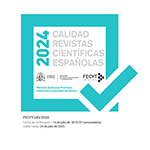Public participation in Spain. Some notes based on the Social Barometer of Spain
Abstract
At the level of proclaimed principles, one of the hallmarks of Western democracy is public participation in political, economic and cultural life. In practice, however, the daily management of these areas is provided by professional politicians, transnational corporations and media oligopolies. This paper seeks to collect in a broad sense the forms of citizen participation in the field of politics. While indirect participation through the electoral process has been remarkable in the last three decades, direct intervention in the public sphere is very limited, except for a more active social minority or, in exceptional cases, of collective mobilization. Both the data from the Social Barometer of Spain as well as quantitative and qualitative surveys of public opinion suggest that we live more in a technocratic or plutocratic society rather than a democratic one. The political model established in Spain in recent decades provides an ambivalent institutional framework for public participation: on the one hand, it affirms the right of participation and sets out some concrete ways that did not exist previously; on the other, the emphasis on delegation (representation mechanisms) imposes restrictions on direct participation in public affairs.Downloads
Article download
License
In order to support the global exchange of knowledge, the journal Cuadernos de Trabajo Social is allowing unrestricted access to its content as from its publication in this electronic edition, and as such it is an open-access journal. The originals published in this journal are the property of the Complutense University of Madrid and any reproduction thereof in full or in part must cite the source. All content is distributed under a Creative Commons Attribution 4.0 use and distribution licence (CC BY 4.0). This circumstance must be expressly stated in these terms where necessary. You can view the summary and the complete legal text of the licence.









